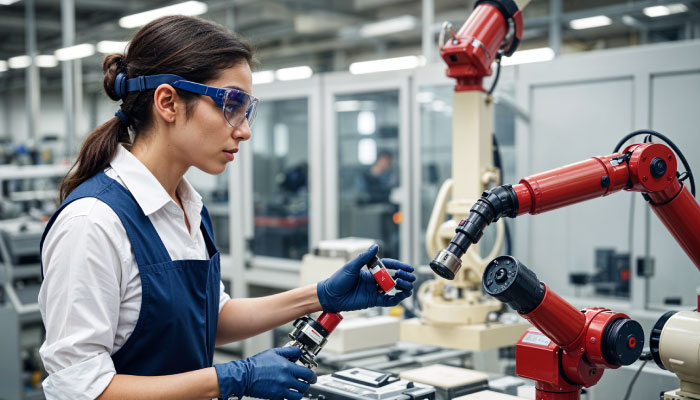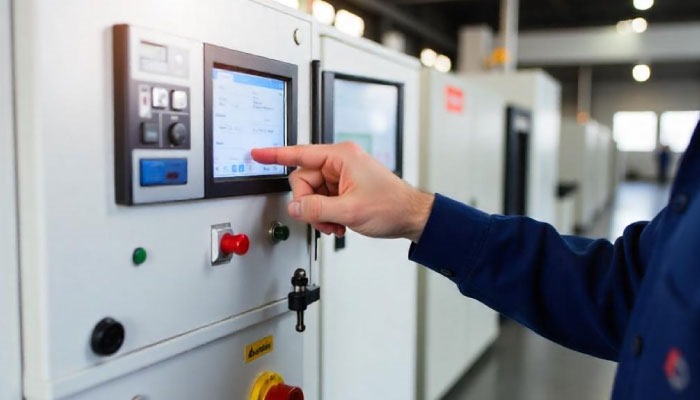How Digital Timers Enhance Efficiency in Industrial Processes

In the fast-paced world of industrial automation, efficiency is key to maintaining competitiveness and maximizing productivity. One of the often overlooked components that play a critical role in streamlining operations is the digital timer. These devices, though small and seemingly simple, have a significant impact on the efficiency and reliability of industrial processes. In this blog, we will explore how digital timers contribute to enhancing efficiency in industrial settings, the various applications they serve, and why they are indispensable in modern manufacturing.
The Role of Digital Timers in Industrial Processes
Digital timers are electronic devices used to measure and control time intervals in various industrial applications. Unlike analog timers, digital timers offer precise control, flexibility, and ease of use, making them ideal for complex and time-sensitive operations. They can be programmed to start, stop, or delay operations based on specific time settings, ensuring that processes are carried out accurately and consistently.
In industrial environments, where precision and timing are crucial, digital timers are employed to manage a wide range of tasks, from controlling conveyor belts and automated machinery to regulating heating cycles and production lines. Their ability to provide accurate timing control helps reduce errors, minimize downtime, and optimize resource use, ultimately leading to enhanced efficiency.
Enhancing Process Control
- Precision and Accuracy
One of the most significant advantages of digital timers is their precision. They allow operators to set exact time intervals, ensuring that processes are initiated or terminated at the right moment. This level of accuracy is particularly important in industries where timing can affect the quality of the product, such as in chemical processing, food production, and pharmaceuticals.
For example, in a chemical plant, the timing of ingredient mixing can directly influence the quality of the final product. Digital timers ensure that each step of the process occurs at the correct time, preventing over-processing or under-processing, which can lead to costly waste or product defects.
- Consistency in Operations
Digital timers provide consistent and repeatable results, which are vital for maintaining quality control in manufacturing. By automating the timing of repetitive tasks, digital timers eliminate the variability that can occur with manual timing. This consistency not only improves the quality of the products but also boosts overall operational efficiency by reducing the likelihood of errors and rework.
In an assembly line, for instance, digital timers can be used to control the timing of robotic arms that perform welding, cutting, or assembly tasks. Consistent timing ensures that each component is processed uniformly, leading to a higher-quality end product and a more efficient production process.
- Flexibility and Programmability
Modern digital timers offer a high degree of flexibility, allowing operators to program them for various functions such as delay start, interval timing, and cycle control. This programmability makes digital timers versatile tools that can be adapted to different industrial processes and requirements.
For example, in an automated packaging line, digital timers can be programmed to control the timing of conveyor belts, ensuring that each package is filled, sealed, and labeled with precise timing. The ability to adjust the timer settings allows for easy reconfiguration of the line to accommodate different product sizes or packaging materials, enhancing the overall flexibility of the production process.
Reducing Downtime and Increasing Productivity
- Automation and Control
Digital timers are essential components in automation systems, where they help streamline operations and reduce the need for manual intervention. By automating the start and stop times of machines, digital timers contribute to a smoother workflow and minimize downtime caused by human error or delays.
For example, in a bottling plant, digital timers can be used to synchronize the operation of different machines, such as filling stations, capping machines, and labeling units. Automation ensures that each machine starts and stops at the right time, preventing bottlenecks and ensuring a steady flow of production.
- Energy Efficiency
Another important benefit of digital timers is their contribution to energy efficiency. By controlling the operation times of equipment, digital timers help reduce energy consumption and operational costs. This is particularly valuable in industries where machinery must be kept running only during specific hours or under certain conditions.
For instance, in HVAC systems, digital timers can be used to regulate the operation of heating and cooling units based on occupancy patterns or production schedules. This ensures that energy is not wasted during non-productive hours, leading to significant cost savings and a reduced environmental footprint.
- Maintenance Scheduling
Digital timers can also be used to automate maintenance schedules, ensuring that machinery is serviced at regular intervals. By triggering maintenance reminders or automatically shutting down inspection equipment, digital timers help prevent unexpected breakdowns and extend the lifespan of industrial assets.
For example, in a manufacturing plant, digital timers can be programmed to alert operators when a machine has reached a certain number of operating hours, signaling that it is time for routine maintenance. This proactive approach to maintenance reduces the risk of unplanned downtime and keeps the production line running smoothly.
Improving Safety and Reliability
- Enhanced Safety
In industrial environments, safety is paramount, and digital timers contribute to safer operations by controlling the timing of potentially hazardous processes. For instance, digital timers can be used to delay the start of machinery until safety checks are completed, ensuring that operators are not exposed to dangerous conditions.
In addition, digital timers can be integrated into emergency shutdown systems, automatically halting operations in the event of an anomaly or malfunction. This immediate response helps prevent accidents and protects both personnel and equipment.
- Reliable Operation
Digital timers are intended to operate consistently under harsh industrial conditions, including extreme temperatures, humidity, and vibration. Their robust construction and dependable performance make them suitable for use in a wide range of industrial applications, from automotive manufacturing to food processing.
The reliability of digital timers ensures that critical processes are executed as planned, without the risk of malfunction or timing errors. This reliability is necessary for keeping production schedules and meeting customer demands.
Conclusion
Digital timers are indispensable tools in the industrial sector, offering precision, consistency, and flexibility that enhance the efficiency of various processes. By automating tasks, reducing downtime, and improving safety, digital timers play a crucial role in optimizing operations and maximizing productivity. As industries continue to embrace automation and smart manufacturing, the importance of digital timers in achieving operational excellence will only grow.
For industries looking to enhance their process efficiency and reliability, investing in high-quality digital timers is a smart choice. These devices not only streamline operations but also contribute to energy savings, improved safety, and long-term operational success.
Unlock the full potential of your industrial processes by investing in precision-engineered digital timers from Theta Controls. Our timers are designed to enhance efficiency, reduce downtime, and improve safety, helping you achieve operational excellence.
Don’t wait—streamline your operations and boost productivity today!
Contact Theta Controls now to learn more about our digital timer solutions.


